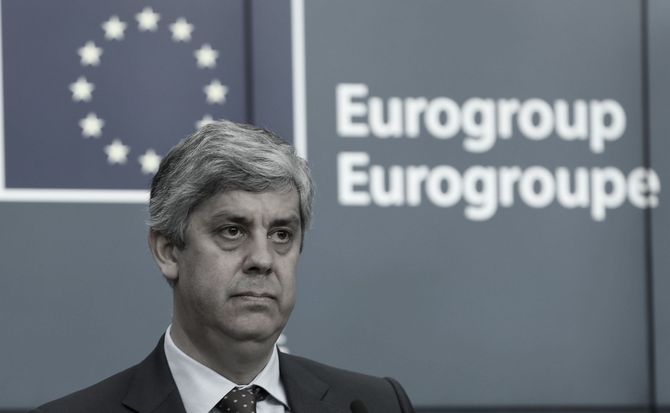Mario Centeno’s useful ambiguities
New Eurogroup Chairman Mario Centeno is known as a socialist, but despite his “anti-austerity” reputation, he slashed government spending and deficits while he was finance minister of Portugal. This earned him trust on both sides of the fiscal policy divide, and will allow him either to keep the Eurogroup as a low-profile talking shop.

In a nutshell
- Mario Centeno is the new Eurogroup chairman
- Known as a socialist, he has also slashed spending
- This ambiguity has helped him build consensus
- This will help him if eurozone leaders want to start setting independent policy
The so-called Eurogroup, which includes the European finance ministers of the eurozone, has a new chairman. He is Mario Centeno, the former Portuguese finance minister who gained a reputation for having revived his country’s economy. Portugal’s gross domestic product (GDP) is estimated to have grown by more than 2.5 percent in 2017, driven by a boom in private investment, while public debt has stabilized at about 130 percent of GDP.
What can we expect from Mr. Centeno’s leadership? To appreciate his future role, let us pause for a moment and consider his record. He is known as a socialist and, not surprisingly, is widely perceived as a strong believer in government intervention.
However, despite his reputation for being “anti-austerity,” he cut government expenditure to 44 percent of GDP (it was 52 percent in 2014) slashed public investments by about a third and increased indirect taxation (similar to proportional taxation).
As a result, in 2016 the Portuguese government budget deficit narrowed to 2 percent of GDP, from 4.4 percent in 2015 and 7.2 percent in 2014. This of course meant it was also within the 2.5 percent limit requested by the EU authorities.
This apparent contradiction explains the secret to Mr. Centeno’s success. He was widely praised by EU hardliners (including German Finance Minister Wolfgang Schauble) for meeting and overshooting the bloc’s requirements. At the same time, he became the darling of anti-austerity groups throughout Europe for showing that a socialist can fix dramatic budgetary problems, keep the EU technocrats at bay and play populist refrains (raising pensions), all at the same time. Of course, there is no need to keep eurocrats and EU politicians at bay once you have complied with their demands.
Continuity or change?
It appears that Mr. Centeno has been able to please those who believe that EU policymaking should aim for fiscal discipline, as well as those advocating more transfers to the lower income groups and possibly more regulation – for example, in labor markets. This has helped him build consensus.
It is unlikely that Mr. Centeno’s skills alone will make the Eurogroup a powerful player.
It is unlikely that Mr. Centeno’s skills alone will make the Eurogroup a powerful player within the EU framework. The Eurogroup is little more than a meeting room attended by the finance ministers of the euro area, in the presence of the vice president of the European Commission and of the president of the European Central Bank. The ministers attending the Eurogroup meetings are encouraged to talk to each other and exchange their ideas, but they decide nothing.
At best, they can fly back to their home countries, brag about their individual roles at the meeting and tell the press how their colleagues feel and in which direction other organs (such as the Economic and Financial Affairs Council – Ecofin) might steer EU policymaking. This is the official definition of the role of the Eurogroup – close coordination of economic policies.
In this light, one may wonder whether Mr. Centeno’s appointment means continuity or a step toward radical change orchestrated by the EU’s most influential members. In the first scenario, the Eurogroup would remain largely irrelevant. In the second, Mr. Centeno’s role would be crucial.
Low-profile Eurogroup
Let us examine the first possibility. As mentioned above, the Eurogroup is currently a lesser copy of Ecofin. It only includes representatives from the eurozone, and it takes no decisions. By contrast, Ecofin includes representatives from all EU members and makes nonbinding decisions.
Mr. Centeno would be the appropriate choice if EU authorities want to stick to a low-profile Eurogroup and signal that the future composition of the Union will not be determined by its monetary standards. There will not be two separate policymaking bodies, and authorities will strive to defuse eventual tensions between the euro and the non-euro members.
His record shows that one can be rigorous and yet resort to a populist veneer to cloud substance.
Until now, Mr. Centeno has behaved rather quietly, possibly gently digging in only when the framing of a ruling would have caused avoidable tensions. His record shows that one can be rigorous and yet resort to a populist veneer to cloud substance: the perfect way to leave things as they are.
Active eurozone
On the other hand, if one believes that policymaking in the eurozone will gradually gain a life of its own, Mr. Centeno’s role would be crucial in assuring that the institutional drift eventually leading to equal status and different jurisdictions for the Eurogroup and Ecofin remains smooth.
Perhaps more importantly, Mr. Centeno will be asked to ensure that the process of separating the eurozone from the rest does not provoke strains within the Eurogroup itself. After all, homogeneity within the eurozone is not manifestly greater than among the non-euro EU members. Mr. Centeno might perhaps lack the charisma necessary to bring about change, but he would certainly be a suitable partner if others led the charge.
To conclude, regardless of the grand strategy behind his appointment, Mr. Centeno seems to be the right choice from the standpoint of the EU authorities. Their interests will be served by an able and experienced professional. However, Mr. Centeno will hardly be the man to challenge the EU vision of the past and curb eurocrats’ power.






